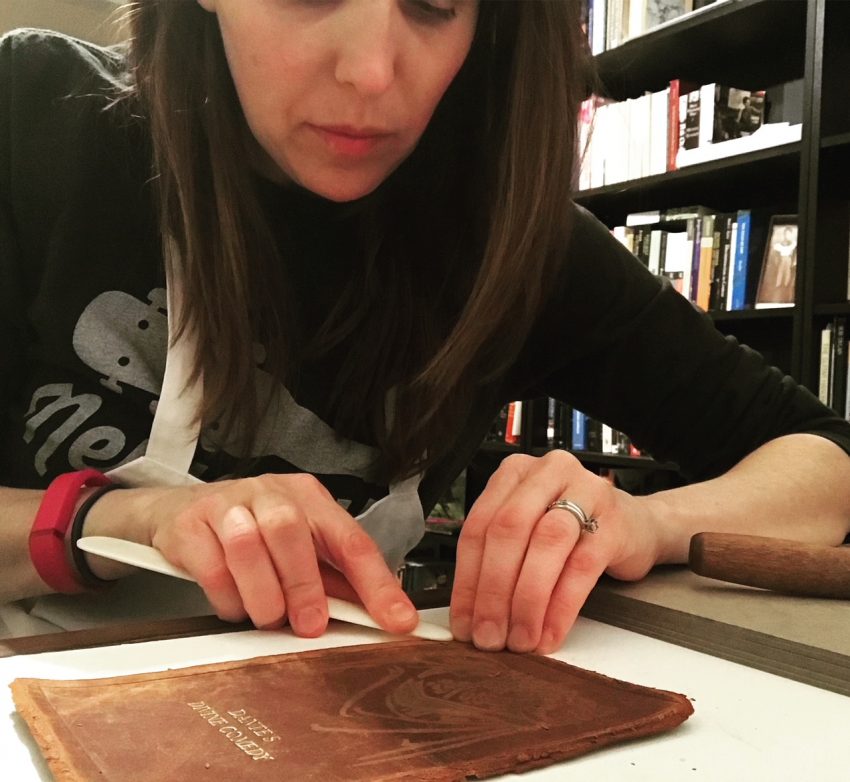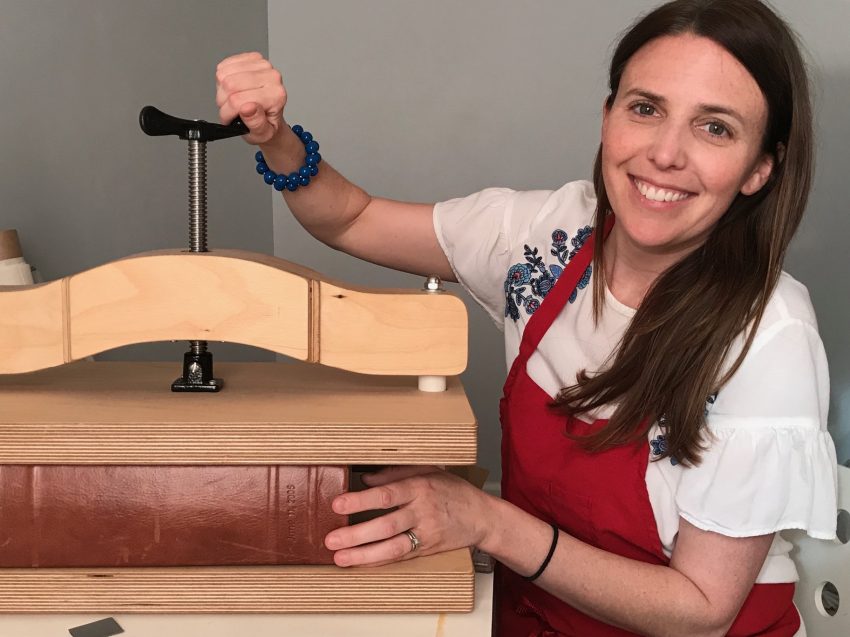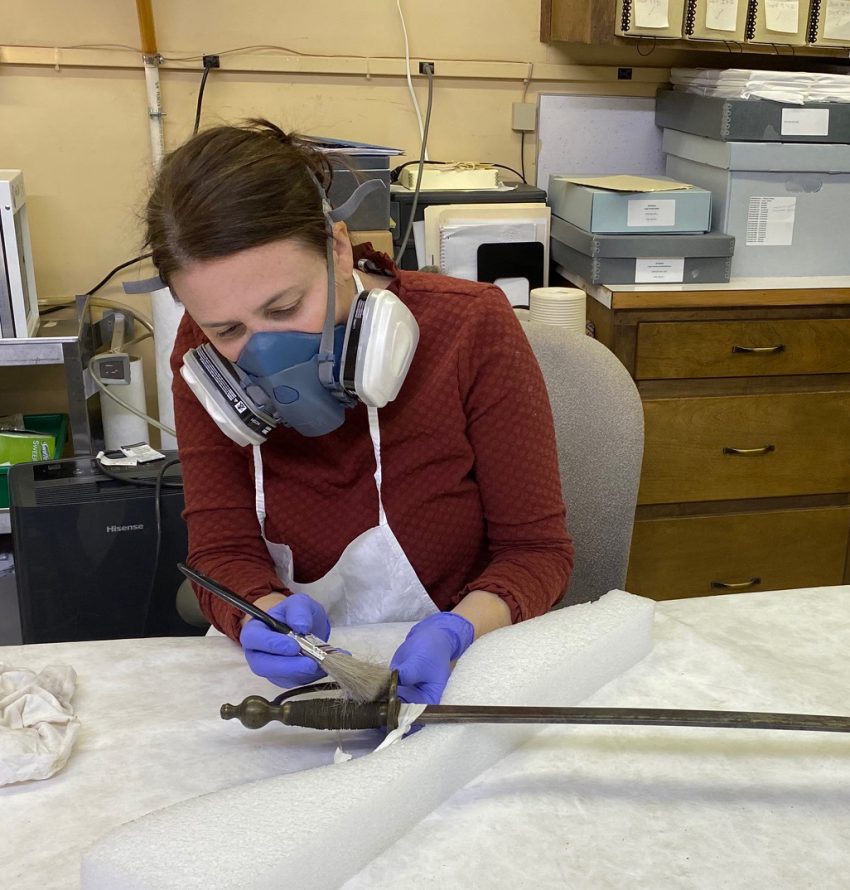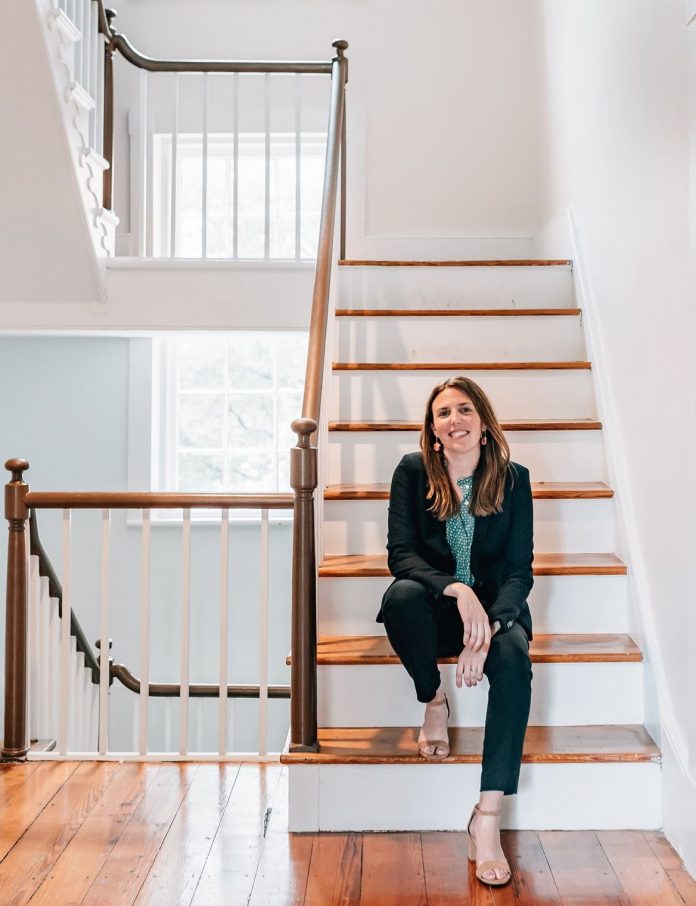We talked recently with Ali Pizza, Assistant Director of the Gaston County Museum and owner of James Street Bindery.
GA: So Ali, where did you grow up and go to school?
Ali: I was born in Philadelphia but grew up in a log house in a rural part of Southern NJ often called the Pine Barrens. It was a great natural setting to grow up in– fishing, camping, building forts, and climbing trees. I come from a large family and went to private Catholic schools until College, where I attended The University of the Arts in Philadelphia. I majored in glass blowing and textiles and absolutely loved the world of art that opened up to me, there. My first job after graduation was at The Philadelphia Museum of Art in object conservation, where my career began.
GA: We know that you work at the museum in Dallas. How did you come to be in Dallas?
Ali: Well, I’ve been working in Gaston County for over a decade but have been in Dallas as Assistant Director of the Gaston County Museum of Art and History since 2017. Before that, I was Director of Preservation at Belmont Abbey College. My husband, Joseph Pizza, and I traveled a lot when we were first married, and after spending 4 years in England we finally made it back home to the Philadelphia area with our young children. So, when he was offered a job as Professor of English at Belmont Abbey College, I stubbornly told him “I’m only moving again if they have a rare book collection.” Little did I know that one of the most significant rare book collections in the Southeast was waiting for me in the basement of the Abbot Vincent Taylor Library!
In my time at the Abbey, I truly embraced the history of the monastery and college and made lifelong friends with monks and colleagues. However, it wasn’t until I came to Dallas that I truly fell in love with the history, art, and people of Gaston County. Service has always been a driving force behind my work and being able to serve the people of Dallas and the County by bringing their stories to light through the museum inspires me every day. My colleagues at the Gaston County Museum really exemplify the authentic connection each one of us have to this area, and I feel blessed to be part of the work we are doing to preserve Gaston County’s history for future generations.

GA: You have pretty impressive education in rare books and conservation-tell us about that…
Ali: Thank you! I am very grateful for the experiences that have shaped my career. I was trained as an apprentice to the Rare Book Binders at Oxford University’s Bodleian Library while living in England. My husband completed his doctorate there, and I spent four years working directly under some of the most talented book conservators in the world. It was an incredible experience—I learned how to repair ancient books and manuscripts on paper, parchment, and leather. My mentor taught me an essential element of apprenticeship, just as he learned from his mentor, that the master must pass on her skills and knowledge to future generations so that our craft lives on. I carry that idea with me daily and have mentored dozens of students both in my time at the Abbey and at the Gaston County Museum.
I also have a small business called James Street Bindery where I offer consultations on preservation for organizations, educational institutions, and private collectors. Occasionally I take on small conservation projects that I can complete in my “free time” (outside of working at the museum, family life, and attending graduate school!) Items of historic importance to Gaston County take priority because they fulfill my desire to serve the community in meaningful ways. One example would be Larkin Stowe’s Will and Testament on display at the Belmont Historical Society. It was written in 1855 and lists the names of 37 enslaved people. I hope that my preservation of this document might lead to future generations discovering their lost histories.
GA: So does the Gaston County Museum have a large collection of books that need conservation? What is your role at the Museum?
Ali: Great question! Actually, the Gaston County Museum’s collection is made up mostly of art and artifacts from the region. It includes objects like historic clothing, quilts, farm tools, large textile machinery, baskets, and ceramics, as well as an impressive art collection of regional works from artists such as Frank Creech, C.M. Kakassy, Roy Lindsay Woods, David Childers, Juan Logan, and more. Additionally, the Museum is home to thousands of archives and photographs that tell the history of our area. Some of these are books, like the Kastner Family Bible printed in 1564 and brought to Gaston County by Adam Kastner in 1745. However, my role at the museum is not to physically preserve the items in the collection, but to promote preservation at an institutional level.
Of course, my knowledge of rare collections informs everything I do, but as Assistant Director my role is to create a vision for the museum’s future in tandem with our Director, Jason Luker. I am passionate about leading teams of creative people to create change through the arts and am surrounded by talented colleagues who feel similarly about the need for progress in museums. Often, we imagine museums as places that are filled with old artifacts and DO NOT TOUCH signs. I believe that museums should be places of discovery—where art and history are accessible and where all people see their stories reflected.

GA: Tell us about some of the more interesting projects you have worked on…
Ali: I should be better at answering this question by now! It’s hard to pick just a few, but one of my favorite projects was helping to restore Mary Shelley’s original Frankenstein manuscript at Oxford University. This was a project that I couldn’t speak about until after it’s completion because of security reasons—which made it even more exciting! We worked in a remote location at the top of the Clarendon building with a view of the medieval city of Oxford—it was incredible.
Another interesting project I worked on was at the Philadelphia Museum of Art with the Decorative Art Conservators. We cleaned an Alfons Bach chair in the Bauhaus style found in the top of the PNC skyscraper so it could go on exhibit at Yale University. The interesting part about this project, though, is that we used saliva to clean it! Conservators have fascinating tools and techniques for their work, but saliva was one that certainly surprised me!
GA: Your website says you do conservation, consulting, and workshops. Are you currently active in all three?
Ali: My work at James Street Bindery is very limited right now as I pursue my graduate degree in Arts Administration at Winthrop University. Currently, I am accepting consulting work and the occasional workshop, but not conservation. I will finish my graduate degree this summer, 2022, and look forward to resuming conservation work by request, then.

GA: What exciting things are going on at the museum?
Ali: So many things! My favorite program of the year is coming up on February 19th and is a partnership with Opera Carolina’s OperaXpress. This is an opera specifically geared toward children and is offered free of charge. This year’s production is “Green Eggs and Ham” and is sure to be fun, silly, and inspire a love of musical performance in the youngest of children! The event requires registration — more details are on our webpage.
In September the museum opened a brand-new collections and archives facility on Dallas-Cherryville Hwy. The new space features a public research room for the first time in museum history, and state-of-the-art storage. Collections Manager, Markecia Koulesser, is taking appointments on Tuesdays and Thursdays for residents interested in donating to the museum or learning more about museum collections. This is a huge feat for the museum’s projected growth, and we expect hours to expand as interest from the community grows.
Lastly, the Museum has hired a new Curator, Alicyn Wiedrich, who brings a wealth of curatorial experience with her. Alicyn is a member of the museum’s leadership team and shares our vision of incorporating diverse and inclusive art and history into our collections, exhibits and programs. In early March the museum will unveil an important new addition to its permanent exhibitions that reflects this shift—follow us on social media and sign up for our newsletter to be the first to hear!
We can’t wait for you to get to know your NEW museum. Check out our website at www.gastoncountymuseum.org or just stop by—entry is free of charge.
GA: Where do you foresee your work taking you in the future?
Ali: That’s a big question! I see myself as a transformational leader, a change agent, and someone who is deeply and authentically connected to the people around me. Mostly, I love working in positions where I can make a difference—whether it’s in a maternal role at home raising our children, a leadership role shaping the future of the museum, or at my bookbinding bench, hands covered in leather, bringing history to life. I feel immensely thankful for the experiences that have shaped me as a person, including my time spent abroad where I experienced what it feels like to be a foreigner in a land that isn’t home. These experiences have spurred me to encourage and mentor others, and I hope to continue serving the communities of Gaston County through the arts and culture that shape us and ultimately tie us together.

